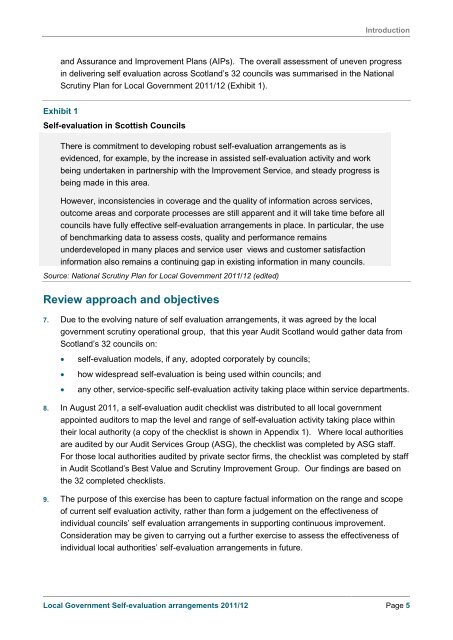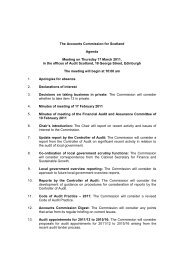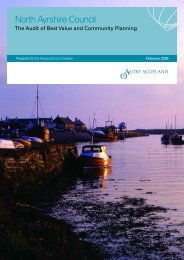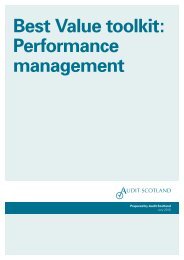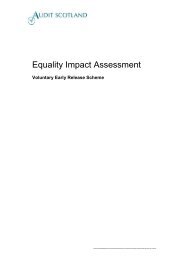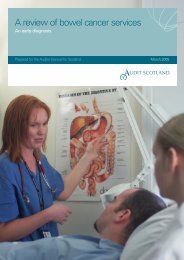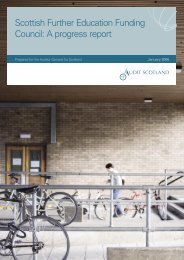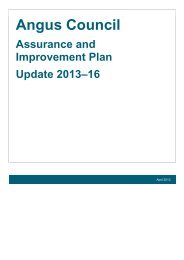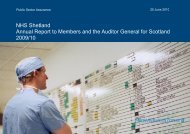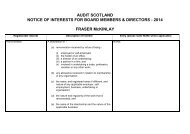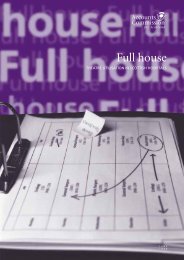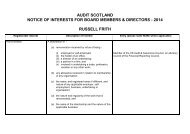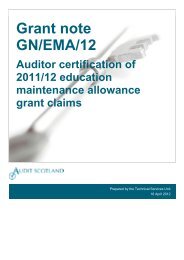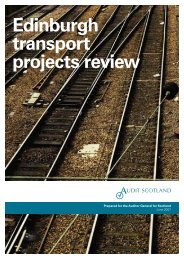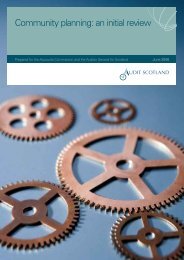Local Government self-evaluation arrangements ... - Audit Scotland
Local Government self-evaluation arrangements ... - Audit Scotland
Local Government self-evaluation arrangements ... - Audit Scotland
Create successful ePaper yourself
Turn your PDF publications into a flip-book with our unique Google optimized e-Paper software.
Introductionand Assurance and Improvement Plans (AIPs). The overall assessment of uneven progressin delivering <strong>self</strong> <strong>evaluation</strong> across <strong>Scotland</strong>’s 32 councils was summarised in the NationalScrutiny Plan for <strong>Local</strong> <strong>Government</strong> 2011/12 (Exhibit 1).Exhibit 1Self-<strong>evaluation</strong> in Scottish CouncilsThere is commitment to developing robust <strong>self</strong>-<strong>evaluation</strong> <strong>arrangements</strong> as isevidenced, for example, by the increase in assisted <strong>self</strong>-<strong>evaluation</strong> activity and workbeing undertaken in partnership with the Improvement Service, and steady progress isbeing made in this area.However, inconsistencies in coverage and the quality of information across services,outcome areas and corporate processes are still apparent and it will take time before allcouncils have fully effective <strong>self</strong>-<strong>evaluation</strong> <strong>arrangements</strong> in place. In particular, the useof benchmarking data to assess costs, quality and performance remainsunderdeveloped in many places and service user views and customer satisfactioninformation also remains a continuing gap in existing information in many councils.Source: National Scrutiny Plan for <strong>Local</strong> <strong>Government</strong> 2011/12 (edited)Review approach and objectives7. Due to the evolving nature of <strong>self</strong> <strong>evaluation</strong> <strong>arrangements</strong>, it was agreed by the localgovernment scrutiny operational group, that this year <strong>Audit</strong> <strong>Scotland</strong> would gather data from<strong>Scotland</strong>’s 32 councils on:<strong>self</strong>-<strong>evaluation</strong> models, if any, adopted corporately by councils;how widespread <strong>self</strong>-<strong>evaluation</strong> is being used within councils; andany other, service-specific <strong>self</strong>-<strong>evaluation</strong> activity taking place within service departments.8. In August 2011, a <strong>self</strong>-<strong>evaluation</strong> audit checklist was distributed to all local governmentappointed auditors to map the level and range of <strong>self</strong>-<strong>evaluation</strong> activity taking place withintheir local authority (a copy of the checklist is shown in Appendix 1). Where local authoritiesare audited by our <strong>Audit</strong> Services Group (ASG), the checklist was completed by ASG staff.For those local authorities audited by private sector firms, the checklist was completed by staffin <strong>Audit</strong> <strong>Scotland</strong>’s Best Value and Scrutiny Improvement Group. Our findings are based onthe 32 completed checklists.9. The purpose of this exercise has been to capture factual information on the range and scopeof current <strong>self</strong> <strong>evaluation</strong> activity, rather than form a judgement on the effectiveness ofindividual councils’ <strong>self</strong> <strong>evaluation</strong> <strong>arrangements</strong> in supporting continuous improvement.Consideration may be given to carrying out a further exercise to assess the effectiveness ofindividual local authorities’ <strong>self</strong>-<strong>evaluation</strong> <strong>arrangements</strong> in future.<strong>Local</strong> <strong>Government</strong> Self-<strong>evaluation</strong> <strong>arrangements</strong> 2011/12 Page 5


